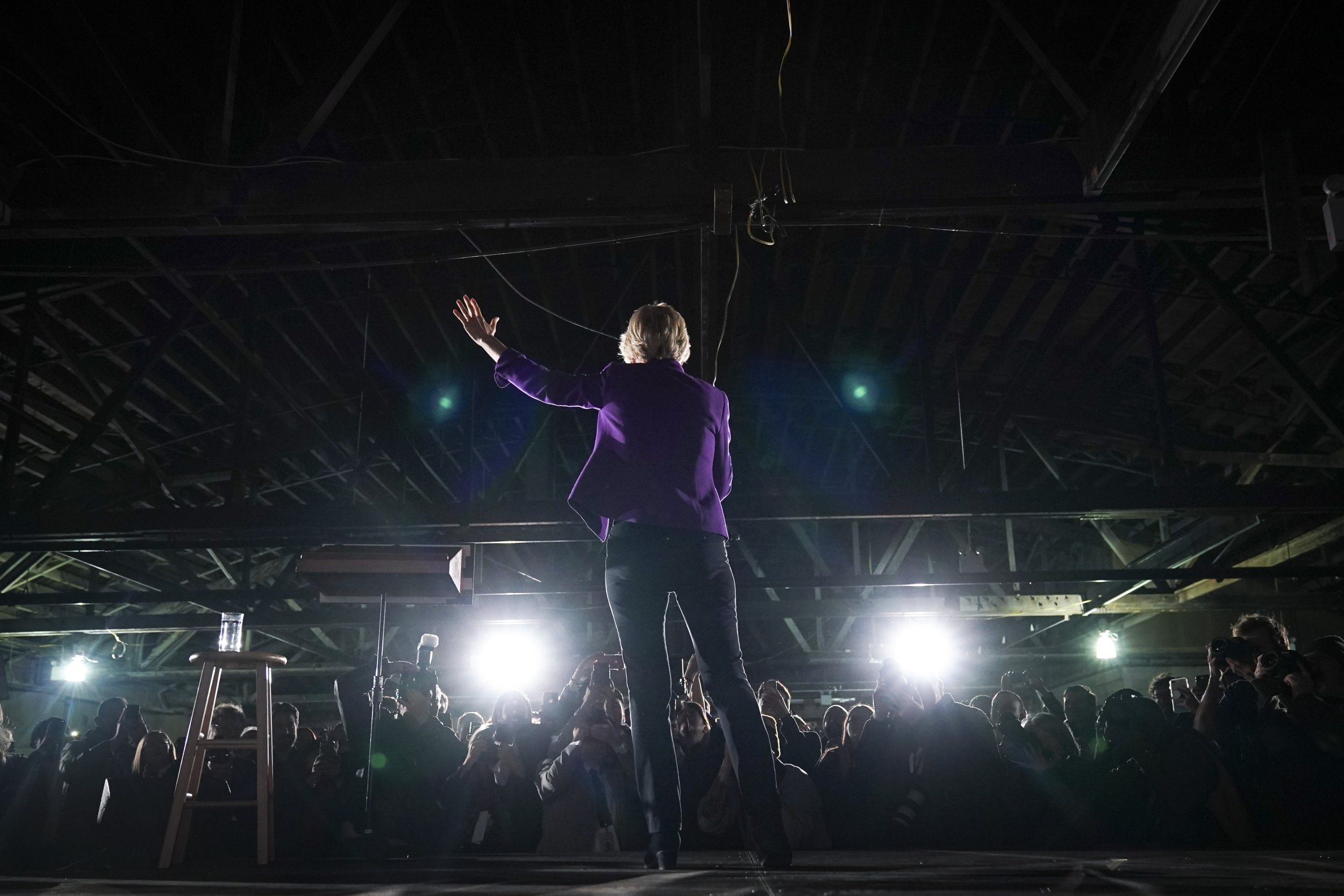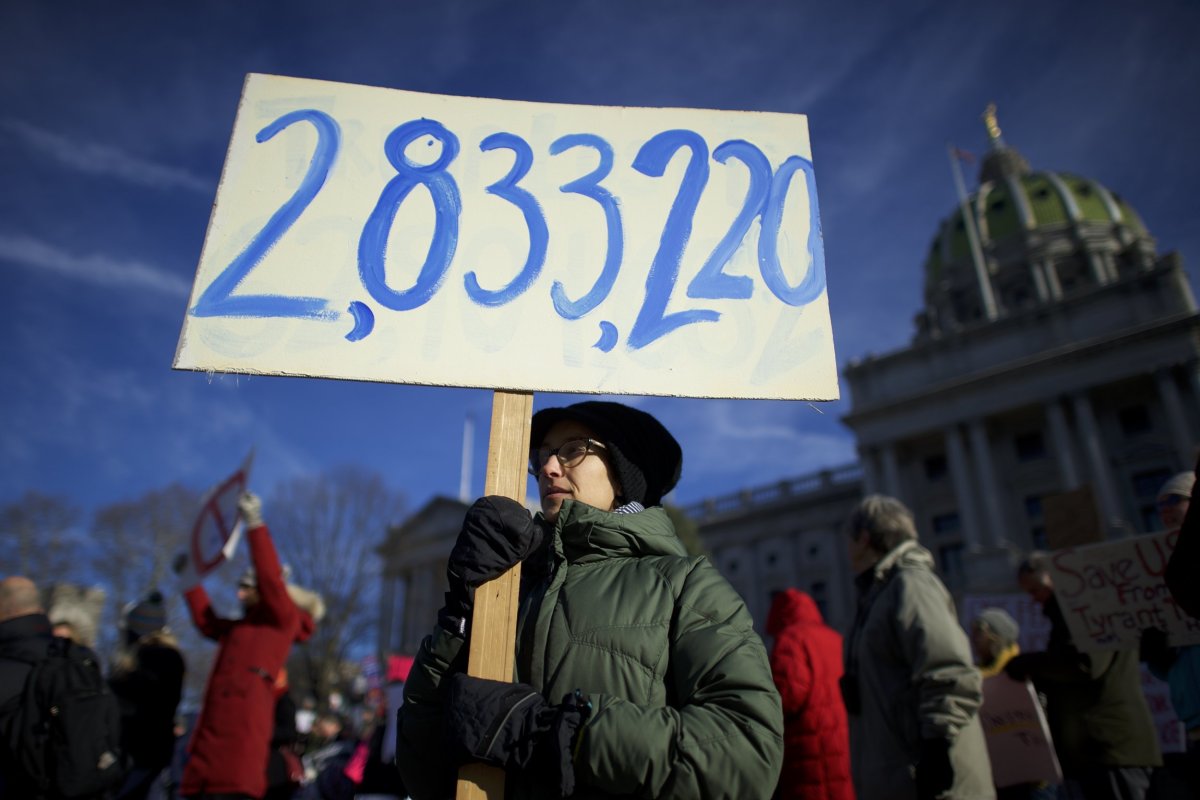
Elizabeth Warren was met with loud applause when the Democratic senator and presidential candidate announced her support to "get rid of the Electoral College" Monday evening at a CNN town hall in Jackson, Mississippi.
"We need to make sure that every vote counts," Warren told the crowd. "The way we can make that happen is that we can have national voting and that means get rid of the Electoral College and everybody.... I think everybody ought to have to come and ask for your vote."
The Massachusetts Democrat suggested a constitutional amendment would be needed. And other 2020 hopefuls, including Beto O'Rourke, Kirsten Gillibrand, Cory Booker and Pete Buttigieg, as of Tuesday, joined Warren's position or previously expressed similar views, saying the Electoral College system was not fair enough.
"I think there's a lot of wisdom in that," Beto O'Rourke, presidential candidate and former Texas congressman, told NBC News Tuesday. The current system, he said, "puts some states out of play altogether."
Warren and O'Rourke echoed what many Electoral College critics have long argued—presidential elections come down to a handful of key battleground states worth a large amount of electoral votes, and the system allows candidates who lose the popular vote, such as George W. Bush and Donald Trump, to emerge victorious. Supporters of the Electoral College, however, argue it gives a voice to voters in smaller states whose ballots would otherwise be overshadowed by more populous states.
"Come a general election, presidential candidates don't come to places like Mississippi," Warren said. "They also don't come to places like California and Massachusetts. Because we're not the battleground states."
The Electoral College system, in which candidates must win enough states to surpass 270 electoral votes, is deeply rooted in U.S. history. It was the result of a last-minute compromise at the Constitutional Convention in Philadelphia in 1787.
"The convention was deadlocked. They couldn't really figure it out," Alexander Keyssar, a Matthew W. Stirling Jr. professor of history and social policy at Harvard University, told Newsweek.
His new book, Why Do We Still Have the Electoral College?, is set to be published this winter.
"At the last minute, they compromised between people who wanted to have Congress choose the president and people who preferred other methods, including a national popular vote," Keyssar said.
The Electoral College is a controversial issue for many Americans, who debate over who the true winners and losers are of such a complex voting system. A national popular vote, in which the candidate who receives the most votes would become president, is a system that many Electoral College critics advocate for.
In two of the previous five presidential elections, once in 2000 and again in 2016, a Republican candidate beat his Democratic candidate by winning the Electoral College vote while losing the popular vote. This dynamic can further complicate the messaging for politicians, driving a wedge further between the two parties over how the country should conduct its most important election every four years.
Republican Senator Marco Rubio, a former presidential candidate whose state of Florida has undergone major election debacles since 2000, was swift to object to abolishing the Electoral College. He labeled Warren's suggestion as "nothing to do with making sure every vote counts." Rather, Rubio tweeted Tuesday, "it's about diminishing the electoral power of what liberals arrogantly call the 'flyover states' and of Americans they habitually disrespect as uneducated and backwards."
"[The] Electoral College was work of genius by founders. It requires candidates for President to earn votes from various parts of country," he said. "And it makes sure interests of less populated areas aren't ignored at the expense of densely populated areas. Ironically same people always preaching about our 'constitutional norms' want to change the ones they find inconvenient."
Democratic Congressman Steve Cohen, who has introduced an amendment to eliminate the Electoral College, called it "a relic of slavery & the 3/5 compromise" on Twitter, arguing that his state of Tennessee is consistently so deep red that "candidates don't take the time to visit Memphis."
"It let slave states wield more influence than their voting population merited," Cohen said. "We need to move toward a '1 person, 1 vote' standard."
But experts who have long-studied the Electoral College and its impact on U.S. elections argue it serves contrary to its original purpose.
"It is certainly undemocratic by any 21st Century criteria of democracy and, in addition, it is one of those things that I think is making the United States more ungovernable," Sanford Levinson, a government professor at the University of Texas at Austin School of Law, told Newsweek.

A common scenario raised by Electoral College critics is that voters in less populous states wield more power compared to those in more populous states. In Wyoming, there is one electoral vote per roughly 194,000 people, while in California, there is one electoral vote per roughly 705,000 people.
But Public Interest Law Professor John Banzhaf of George Washington University Law School, whose mathematical analysis in the 1960s had a different conclusion, disagrees.
"My mathematical analysis demonstrated that just the opposite was true; citizen voters in the most populous states had far more voting power than those in most other states," he told Newsweek.
The reason, Banzhaf said, is that it's more likely an individual voter in California could sway the outcome of a presidential election than someone in Wyoming due to California's large number of electoral votes.
The Electoral College persists, despite public polling continuing to show the majority of Americans are not in favor of it. Levinson believed this was because to institute a change that most citizens would find favorable would require a constitutional amendment. In a poll last summer in the run-up to the midterm elections conducted by the Public Religion Research Institute, Americans supported choosing the president using a national popular vote by roughly a two-to-one margin compared to using the Electoral College.
"You run up against the fact that the U.S. Constitution, as a practical matter, is almost impossible to amend," Levinson said.
To alter the Constitution, an amendment would need a two-thirds majority vote in both the House and Senate and be ratified by three-fourths of state legislatures at a constitutional convention.
It's partly why John Koza, chair of National Popular Vote Inc., a nonprofit group whose purpose is "to study, analyze and educate the public" on implementing a nationwide popular election, advocates for states to bypass the Electoral College and award their electoral votes to whichever candidate wins the national popular vote.
Colorado became the 12th and most recent state to join the movement, known as the National Popular Vote Interstate Compact. The District of the Columbia also signed on. The compact, passed by state legislatures, would require those states to cast their electoral votes for the national popular vote candidate. Currently totaling only 181 electoral votes, the compact will not go into effect until it receives enough states to total 270 electoral votes.
Nebraska and Maine are the only states that do not follow the winner-takes-all rule. Instead, the candidates split the electoral votes proportionate with their vote totals.
"We're in favor of changing the state laws, these state 'winner-takes-all' laws that award all of the state's electoral votes to the candidate who gets the most votes inside each state," Koza told Newsweek. "The states are authorized to do that in the Constitution in Article II, and that's the basis for our bill—we'd like to see the president elected by a popular vote in all 50 states, in which the candidate who gets the most votes become president."
Uncommon Knowledge
Newsweek is committed to challenging conventional wisdom and finding connections in the search for common ground.
Newsweek is committed to challenging conventional wisdom and finding connections in the search for common ground.
About the writer
Ramsey Touchberry is a Washington Correspondent for Newsweek based in the nation's capital, where he regularly covers Congress.
Prior to ... Read more
To read how Newsweek uses AI as a newsroom tool, Click here.








